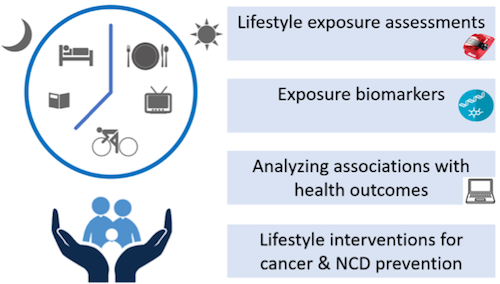
Starting date: January 2021
Work Programme
The overall goal of the Lifestyle Exposure and Interventions Team (LEI) is to leverage lifestyle research (e.g. nutrition, physical activity, sedentary behaviour, sleep, and stress research) to enhance the understanding of lifestyle-related cancers and the prevention potential.
LEI will develop and share innovative methods and sustainable evidence-based lifestyle interventions that will help researchers and other relevant stakeholders to support communities with tailored lifestyle recommendations and effective behaviour change strategies for cancer prevention. This will be done via three integrated objectives:
- enhancing databases of current epidemiological studies with innovative lifestyle behaviour indicators (e.g. food biodiversity and processing, meal timing, circadian rhythm, and stress);
- developing new observational studies (cohort and case–control designs) in high-, middle-, and low-income settings, considering the emerging lifestyle transitions (e.g. IARC–International Initiative for Pediatrics and Nutrition [IIPAN] programme on nutrition and childhood cancer); and
- developing sustainable, cost-effective, and wide-reaching lifestyle behaviour change interventions, and evaluating their efficacy for cancer prevention (e.g. the LIFE-SCREEN intervention currently being evaluated in the colorectal cancer screening programme in France).
Team Composition
Team Leader: Dr Inge Huybrechts, Nutrition and Metabolism Branch (NME), IARC
Email: HuybrechtsI@iarc.fr
Team members:
Dr Agnès Fournier (Visiting Scientist, NME; INSERM CESP)
Mrs Aline Al Nahas (Doctoral Student, Nutritionist, NME)
Ms Corinne Casagrande (Data Manager, NME)
Ms Elodie Faure (Visiting Scientist, Geographic Information Systems, NME; INSERM CESP)
Ms Genevieve Nicolas (Data Manager, NME)
Ms Heleen Van Puyvelde (Doctoral Student, Health Promotion, Ghent University, Belgium)
Dr Jessica Blanco Lopez (Postdoctoral Scientist, Paediatrician, NME)
Ms Karine Racinoux (Secretary, Project Assistant, NME)
Ms Liesel Claeys (Doctoral Student, Pharmacology, Ghent University, Belgium)
Dr Manon Cairat (Postdoctoral scientist, NME/INSERM CESP)
Dr Mohamed Khalis (Visiting Scientist, NME; Mohammed VI University of Health Sciences, Casablanca, Morocco)
Dr Nathalie Kliemann (Postdoctoral Scientist, Nutritionist, Collaborator from Brazil)
Dr Sahar Ghantous (Postdoctoral Scientist, Nutritionist, INSERM CESP)
Ms Tracy Wootton (Project Assistant, NME/LSB)
Key networks: European Prospective Investigation into Cancer and Nutrition (EPIC), International Initiative for Pediatrics and Nutrition (IIPAN), Healthy Lifestyle in Europe by Nutrition in Adolescence (HELENA), Identification and Prevention of Dietary- and Lifestyle-Induced Health Effects in Children and Infants (IDEFICS), UK Biobank (UKB), Determinants of Breast Cancer in Morocco (EDSMAR)
Key funding: Institut national du Cancer (INCa), World Cancer Research Fund (WCRF), Research Foundation – Flanders (FWO), Agence nationale de sécurité sanitaire de l’alimentation, de l’environnement et du travail (ANSES), Agence nationale de la Recherche (ANR), International Initiative for Pediatrics and Nutrition (IIPAN), Cancer Research UK (CRUK), South Africa Breast Cancer (SABC) study, European Commission (EC)
Key publications
- Jacobs I, Taljaard-Krugell C, Wicks M, Cubasch H, Joffe M, Laubscher R, et al. (2021). Dietary patterns and breast cancer risk in black urban South African women: the SABC study. Nutrients. 13(11):4106. https://doi.org/10.3390/nu13114106 PMID:34836361
- Huybrechts I, Kliemann N, Perol O, Cattey-Javouhey A, Benech N, Maire A, et al. (2021). Feasibility study to assess the impact of a lifestyle intervention during colorectal cancer screening in France. Nutrients. 13(11):3685. https://doi.org/10.3390/nu13113685 PMID:34835941
- Iguacel I, Schmidt JA, Perez-Cornago A, Van Puyvelde H, Travis R, Stepien M, et al. (2021). Associations between dietary amino acid intakes and blood concentration levels. Clin Nutr. 40(6):3772–9. https://doi.org/10.1016/j.clnu.2021.04.036 PMID:34130023
- Hanley-Cook GT, Huybrechts I, Biessy C, Remans R, Kennedy G, Deschasaux-Tanguy M, et al. (2021). Food biodiversity and total and cause-specific mortality in 9 European countries: an analysis of a prospective cohort study. PLoS Med. 18(10):e1003834. https://doi.org/10.1371/journal.pmed.1003834 PMID:34662340
- Claeys L, Romano C, De Ruyck K, Wilson H, Fervers B, Korenjak M, et al. (2020). Mycotoxin exposure and human cancer risk: a systematic review of epidemiological studies. Compr Rev Food Sci Food Saf. 19(4):1449–64. https://doi.org/10.1111/1541-4337.12567 PMID:33337079
- Van Puyvelde H, Perez-Cornago A, Casagrande C, Nicolas G, Versele V, Skeie G, et al. (2020). Comparing calculated nutrient intakes using different food composition databases: results from the European Prospective Investigation into Cancer and Nutrition (EPIC) cohort. Nutrients. 12(10):E2906. https://doi.org/10.3390/nu12102906 PMID:32977480
- Mint Sidi Ould Deoula M, Huybrechts I, El Kinany K, Boudouaya H, Hatime Z, El Asri A, et al. (2020). Behavioral, nutritional, and genetic risk factors of colorectal cancers in Morocco: protocol for a multicenter case-control study. JMIR Res Protoc. 9(1):e13998. https://doi.org/10.2196/13998 PMID:31929106

